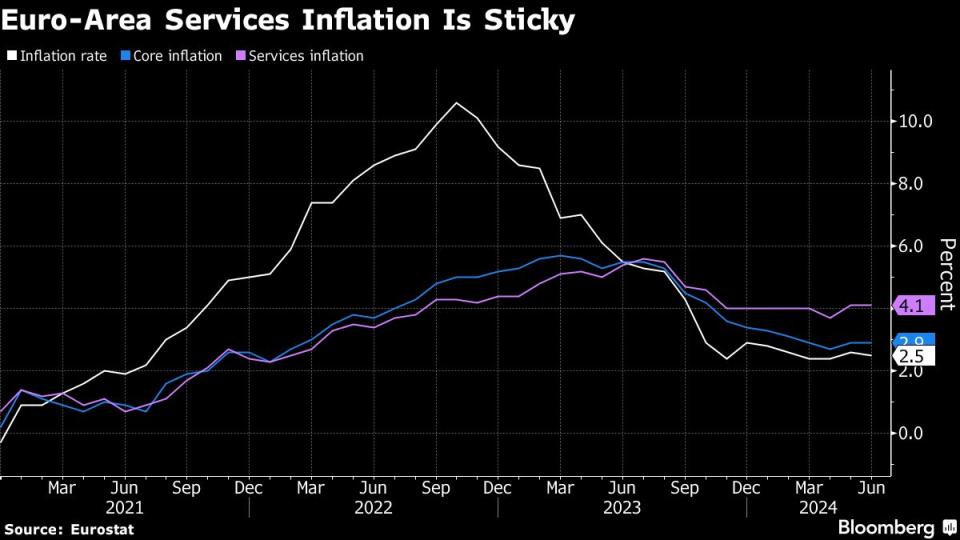ECB’s Panetta Plays Down High Services Inflation Concerns
(Bloomberg) -- The European Central Bank shouldn’t be overly worried about stubborn services inflation and still-robust wage growth, Governing Council member Fabio Panetta said.
Most Read from Bloomberg
Saudis Warned G-7 Over Russia Seizures With Debt Sale Threat
Microsoft Orders China Staff to Use iPhones for Work and Drop Android
Stocks Hold Near Peak as Powell Sticks to Script: Markets Wrap
Biden’s Biggest Donors Left Powerless to Sway Him to End Bid
“Concerns are not unwarranted, but they need to be put into perspective, as services prices tend to move differently from those of goods,” the Bank of Italy governor said Tuesday.
Speaking at the annual meeting of the country’s banking association in Rome, Panetta reiterated that recent data and the outlook allow for a further gradual lowering of borrowing costs.
While euro-zone inflation moderated a touch in June to 2.5%, the gauge for services held steady at 4.1%. Such price pressures are making some ECB officials wary about promising more rate cuts following their initial reduction last month.
President Christine Lagarde said last week that annual price growth for services doesn’t have to hit 2% since its elevated readings can be offset by other components. Greece’s Yannis Stournaras told Bloomberg that the ECB “shouldn’t over-interpret” these figures.
Referring to still-high wage increases, Panetta said that “careful analysis of the data can mitigate fears” — echoing similar remarks he made in a speech at the end of June.
The governor, one of the more dovish ECB policymakers, said that “past key rate hikes are still squeezing demand, production and inflation, and will continue to do so in the coming months.”
According to central bank estimates, the impact of monetary restriction on prices will be even greater in 2024 than in 2023, he added.
“The fall in inflation has made it possible to start easing monetary conditions,” Panetta said. “The reduction in key interest rates will continue at a gradual pace, accompanying the return of inflation to the target, if macroeconomic developments remain in line with the ECB Governing Council’s expectations.”
Speaking at the same event in Rome, Italian Finance Minister Giancarlo Giorgetti urged the central bank to speed up any easing plans.
“It would be good if the pace of interest rate moves began to accelerate soon, gradually, yes, but decisively,” he said. “A further reduction in demand could be unsustainable, and in any case difficult to bear for economies like Italy’s.”
Panetta also said that Italian bank profitability, asset quality and capitalization have improved, adding that their sound position allows them to look at the future “with confidence.”
The country’s lenders posted record profits last year, benefiting from higher rates, and years of painful restructuring, in which they cut bad loans, administrative costs and streamlined structures.
The governor still sees uncertainty linked to the geopolitical situation, domestic politics in some major countries, and a prolonged phase of higher rates that can affect credit quality.
Credit growth has weakened considerably in Italy as a result of monetary tightening. In the first quarter, the inflow of deteriorated loans rose to 2.1% from 1.8% in the previous quarter, and can further grow moderately both this year and the next, Panetta said.
In this environment banks must have a prudential approach on their provisions for loan losses, he said.
On the Italian economy, the central bank predicts 0.8% growth this year, though that would be 0.6% when adjusted for the number of work days, Panetta said. He added that those projections were made in May, before new quarterly data that would raise those numbers by about a 10th of a point.
Giorgetti said new figures show Italy could reach its 1% economic growth goal for this year. He also said there won’t be any need for a “blood and tears” budget but just for more prudent public expenditure and that Italy will keep its accounts in order.
(Adds Finance Minister quotes starting in 10th paragraph)
Most Read from Bloomberg Businessweek
At SpaceX, Elon Musk’s Own Brand of Cancel Culture Is Thriving
How Stocks Became the Game That Record Numbers of Americans Are Playing
©2024 Bloomberg L.P.

 Yahoo Finance
Yahoo Finance 


